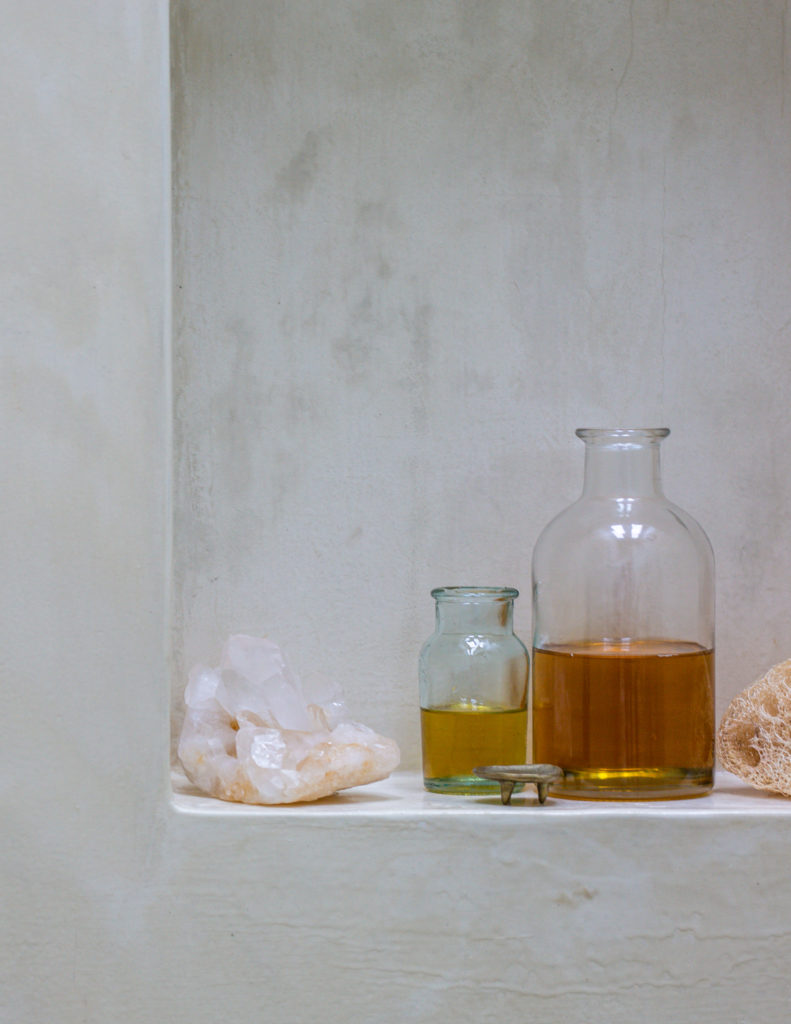Ayurveda: Dinacharya + The Art of Self Care
 This post kicks off a new monthly series where I’ll be talking about little rituals of self-care and natural beauty recipes for that radiant glow inside and out. But before we dive into the external, let’s talk about real beauty for a minute.
This post kicks off a new monthly series where I’ll be talking about little rituals of self-care and natural beauty recipes for that radiant glow inside and out. But before we dive into the external, let’s talk about real beauty for a minute.
If there’s one thing a personal yoga practice has taught me is that you must, absolutely must, take the time to nurture yourself each and every day. These little daily rituals are really meditations on self-love. When we dedicate time daily to nourish our bodies and souls, we cultivate a deep respect and love for ourselves. And when we radiate deep love for ourselves and others – isn’t this the heart of true natural beauty? We can apply all sorts of organic, chemical-free creams, eat a every known superfood we can cram into our green smoothies, and spend 8 hours a week in hot yoga classes – but if we don’t love ourselves at the end of the day, then what’s the point?
We all have routines, and most women have some sort of “beauty routine” in the mornings or evenings. But how much time do we spend in those moments really being present with ourselves and giving thanks to our bodies for being healthy and working hard everyday? This past month, I’ve stepped up my morning routine and turned it into sacred rituals of self-love. I spend 30 minutes or so in the morning working through a series of practices that get me feeling so good by the end it’s hard not to love yourself and others a little bit more. So each month I’ll be sharing these practices in hopes that you can view your own routine as a ritual for cultivating true beauty – radiant self-love.
In Ayurveda, this daily ritual of self-care is called Dinacharya. In Sanskrit, Dina means day, sun or flow, and Charya means practice or conduct. These daily rituals were developed to keep the body in tune with the natural earth cycles and rhythms of the day. Dinacharya practices particularly emphasize the mornings as your most sacred time, as these hours create the foundation for the rest of your day.
Wake Up
You must rise in order to start your day! If you can get to sleep before 10pm, it’s recommended to wake before the sun rises. According to Ayurveda, there are specific times that are best to wake for each different body type, your Prakriti. (To explore your unique constitution, take this quiz here.)
Vata types: 6am
Pitta types: 5:30am
Kapha types: 4:30am
Daily Intention
Before you race out of bed, take a few moments to set an intention for your day, a focus or theme you hope to carry forward with you once you get out from under the covers.
Sip Warm Water
Heat up some water on your kettle and sip a glass of warm water with a squeeze of lime juice with ¼ cup of aloe vera juice, if your bowels are slow to move. Lime juice and aloe work to alkalize your system and stimulate your digestion.
Elimination
What goes in must come out. Elimination is the key to optimal health. Before you race off to your coffee and emails, make sure you create time and a quiet space to release everything from your previous day – or even week sometimes. The body loves routine, give it that in the mornings. Self massage on the abdomen and deep slow breathing into the belly is a wonderful way to gently stimulate a bowel movement.
Wash the Face
Splash the face with cold water to stimulate circulation to the skin. Dry your face gently with a clean towel. Spritz with rosewater afterwards.
Tongue Scraping
Using a stainless steel or copper tongue scraper, scrape the tongue 7-14 times to remove the built up plaque and bacteria from the tongue before brushing the teeth or oil pulling.
Oil Pulling
This is a powerful practice of gargling/swishing oil around the mouth to remove bacteria from the teeth and improve gum health. You can use coconut oil or untoasted sesame oil. Coconut oil is an antifungal, and is usually recommended for this practice. It’s also lighter and easier to swish around in the mouth. Take 1-2 tablespoons, and without swallowing, circulate around the mouth for 5-20 minutes. The full practice is 20 minutes, but it takes a few weeks to build up to this. Brush your teeth well after spitting the oil out. Read here to learn more about oil pulling.
Neti
Neti kriya, or jala neti, is the practice of rinsing purified water through the nasal passages to clean the sinus cavity and improve respiratory health. You can purchase a ceramic neti pot here or at most health food stores. If you have excess mucous, add a pinch of non-iodized salt to the slightly warm water. Follow these instructions on performing neti.
Nasya
After performing neti, use your pinky finger or a cue tip to gently apply sesame oil to the inside of the nostrils. Special herbal oils, called nasya oil, can be used in place of the regular sesame oil.
Garshana
Garshana, or dry skin brushing, is the practice of brushing your skin with raw silk or a natural vegetable bristle brush to remove dead skin and stimulate lymph drainage in the body. Start at your feet and work your way towards the heart with a gentle pressure. Read more about the how-to’s of dry skin brushing here.
Oleation (Abhyanga)
After scrubbing the dry body for 5-10 minutes, apply a very liberal amount of natural, food-based oils like sesame or ashwagandha bala oil is great for vata types, coconut-based oils for pitta types, or a lighter sunflower oil for kapha types. Oiling the skin before you shower also protects your bodies natural oils. Read more about the practice of abhyanga here.
Bath
Our daily showers or baths are an act of cleansing, we remove past impurities we no longer want to hold on to both in the body and in the mind.
Meditate
Take 5 minutes to be still. Sit with yourself and observe what is present today. If you have a longer meditation practice, do this! If you prefer a moving meditation (yoga, tai chi, running), go for this and try to approach it with a still and clear mind.
Breakfast
Take some hot herbal tea to stimulate the digestion like CCF Tea and enjoy a breakfast of your choice. Whatever it is, try to keep this same mindfulness as you chew each bite. More on this eating meditation (Bhoj Kriya) here.
——————————
Okay, so maybe this sounds like a lot to get started with. If you’re worried about not having enough time in the morning, pick 2 activities to start with and see how you can integrate more once you’re comfortable with your morning routine. You can also break them up and do a few in the evening, like your self oil massage practice. But most importantly, if you take anything away from this, remember to create a space of self-love as you move through any practice – that’s the most important thing!
 [wpmenucart]
[wpmenucart] Living Ayurveda: Meal Planning Tips
Living Ayurveda: Meal Planning Tips  Recipes: My Favorite Kitchari Recipe + Ume Pickled Radishes
Recipes: My Favorite Kitchari Recipe + Ume Pickled Radishes  Interview: A Behind-the-Scenes Look at the Making of A Book
Interview: A Behind-the-Scenes Look at the Making of A Book 
[…] with some digestive spices (like adding turmeric to warm milk) or ingesting it with mindfulness to dinacharya – an example bring to eat your largest meal at lunch […]
[…] helps me stay productive without getting too attached to needing routine. I make sure I stick to my daily rituals of self-care to keep my body and mind grounded and stable, amidst all the change that goes on around me. No […]
Wow this is awesome! I’m a kapha type and I have a hard time waking up at 7am. How do you know that 4:30am is ideal for kapha types? I have an 8-month old baby boy that I have to nurse at 7am but if it were up to me I would honestly wake up at 10am. Your blogs are amazing. Thanks for sharing your wisdom.
Hi Brendon! Great questions. This guideline for waking hours was given by Dr. Vasant Lad of the Ayurvedic Institute. My take on this is that it’s not always possible to follow the ancient protocols in modern life, especially when you have a young one to care for and need to rest! In fact, Ayurveda recommends new mothers take a whole year to two just to care for the baby and nurture themselves. My recommendation would be to seek balancing kapha through food and lifestyle practices and get the right amount of rest you need. Dry skin brushing and abhyanga (self oil massage) during your morning routine will get your circulation going and help move out stagnant toxins that can accumulate in kapha types. Also, be sure to add in extra warming spices in your wintertime meals to boost digestion.
These Dinacharya rules for wake up times do not include the elderly, sick, those with small children, etc. So, don’t worry at this stage.
[…] palmarosa and orange, there’s a magnesium oil to relieve achey winter tension. Alongside my regular abhyanga (oil massage) practice, I love to keep a jar of this balm nearby when dry hands, lips or feet need some extra attention. […]
[…] So I’ve made peace with early mornings these past few years and actually find solace in my daily rituals. In fact, I relish in rituals as way to turn the everyday ordinary into a life infused with […]
[…] Repeat daily as a part of your morning dinacharya practice. […]
[…] Here is a quick step-by-step guide on how to use a neti pot. When I’m diligent about my daily dinacharya practice, I like to do neti in the morning after I tongue scrape, oil pull and brush my teeth for overall […]
So, over the years I have been variously ardent and lax about incorporating these elements into my life. I realized that the key, and the first act of self love and self care, is to consciously create time and space for rituals. Not feeling guilty about owning this space in your life. Once we truly say Yes to this truth, none of it seems like work, or something weird we have to explain to our family. With the gift of time and belief in self-love, these rituals become fluid, intuitive and NECESSARY. (And I find I don’t “need” as many products and potions that I used to require). I think most of us still fundamentally wrestle with the willingness to say YES to opening time. The truth is: time makes itself available for us, when our hearts align with our words and deeds. Self care becomes the first celebration of the day, and a pattern of beauty and unity that you can and will spread to everything you do and everyone you touch.
[…] Do this between 6 PM and 10 PM in order to get ready to sleep. Harvard actually published a study, an article, in which it was highlighted how important it is to have a practice that can help the body and the mind to wind down. Ayurveda has been recommended something like this for literally thousands of years through the dinacharya practices. […]
The essay is wonderful, and I appreciate your promoting Ayurveda.